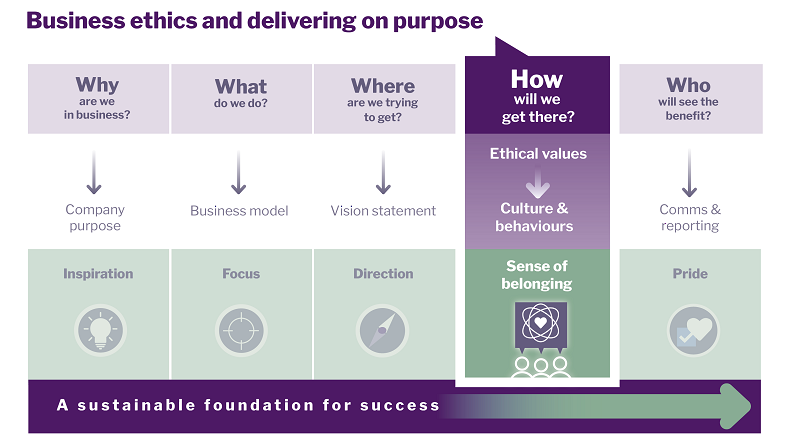Why are we in business? What do we do? Where are we trying to get? How will we get there? None of these questions can be answered independently from the others.

Establishing a clear link between the purpose of the organisation (why are we in business) and the ethical values (how will we get there) is very important to ensure that ethics becomes part of the culture and guides decision-making at all levels of the organisation, promoting the desired behaviours.
Purpose and values are the foundation of an ethics programme. Ethical values guide the way that business is done - what is considered acceptable or desirable behaviour, above and beyond compliance with laws and regulations.
It may be that the organisation’s values are implicit rather than explicit. Although they may not yet have been formally articulated, values underpin ‘the way business is done around here’. Core values exist in most organisations whether they have been consciously created through many years of leaders behaving in a certain way and consciously setting ethical standards, or just left entirely to chance.
Whatever the size or sector, or what policies and programmes are in place, it is the organisation’s values that underpin those policies, and provide the framework for the company’s culture and decision-making.
Ethics policy
The values inform the organisation’s ethics policy. This sets out the organisation’s commitment to high ethical standards and how this will be governed, implemented and monitored.
What are core values?
If an organisation wants to take ethics seriously, it needs to identify the core values or principles to which it wishes to be committed and held accountable. It then needs to translate those values into guidance for all employees so that they are helped with discretionary decisions i.e. when there are no rules or when facing an ethical dilemma. These form the foundation for a set of corporate ethical commitments and the organisation's approach to corporate responsibility.
What is the difference between ethical values and business values?
At the IBE, we differentiate between ethical values (such as honesty, fairness, integrity, trustworthiness, respect) and business values (such as innovation, value-for-money, customer-focus). Business values are what the company will deliver; ethical values are how the business values will be achieved.
What are ethical dilemmas?
An ethical dilemma involves a situation that makes a person question what the 'right' thing to do is. Ethical dilemmas make individuals think about their obligations, duties or responsibilities. It is through a dilemma that most employees experience business ethics.
These dilemmas can be highly complex and difficult to resolve. Complex ethical dilemmas involve a decision between right and right (choosing between right or wrong should not be a dilemma!). An example might be where you uncover a friend's misdemeanour: You have a duty to your employer to report it, but also a duty to be loyal to your friend in a situation that could lead to their dismissal.



